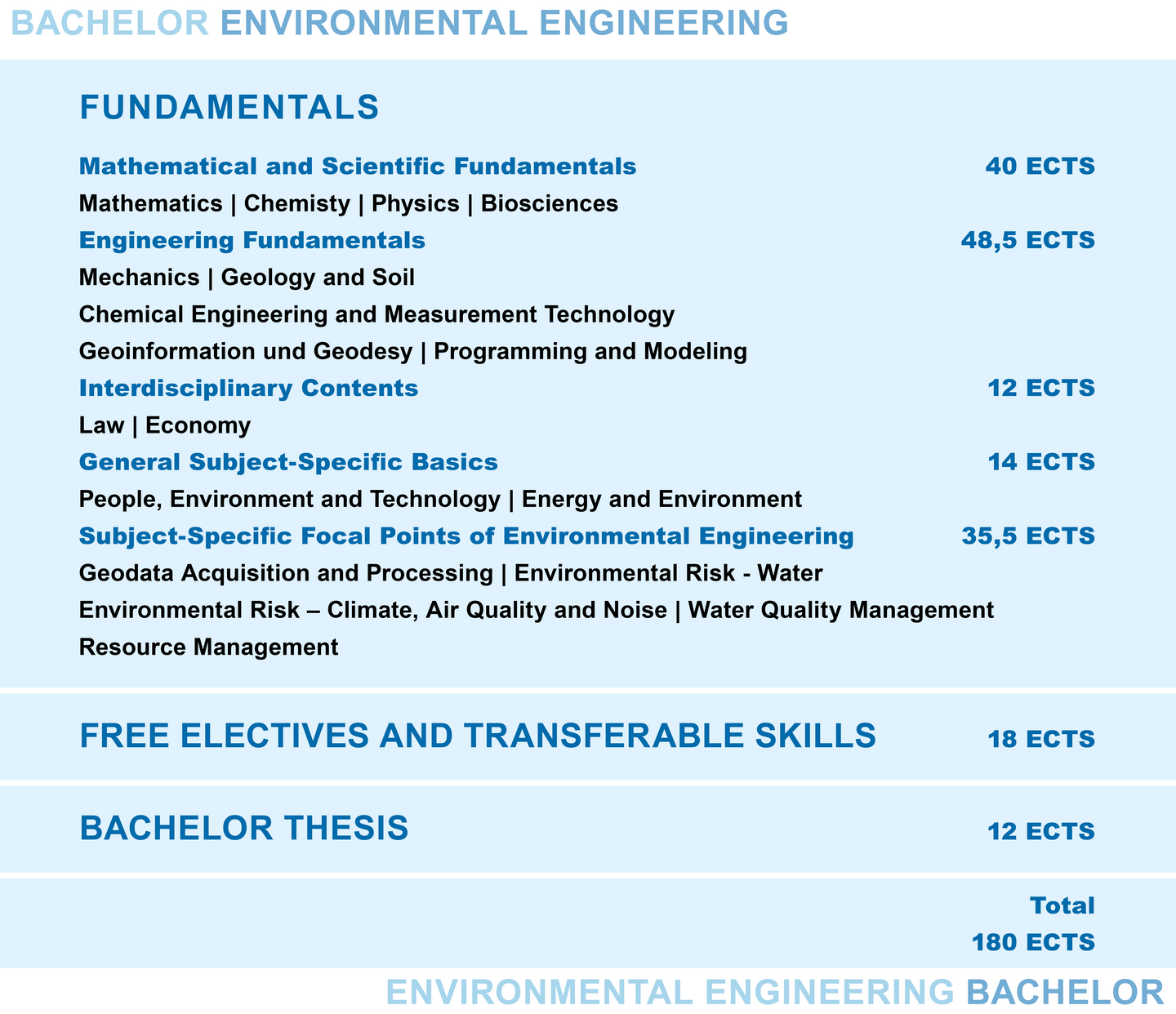Bachelor's Programme Environmental Engineering
- Programme Code
-
UE 033 266 - Environmental Engineering
- Duration of Programme
-
6 semesters
- Credits
-
180 ECTS
- Language
-
German
- Degree
-
Bachelor of Science (BSc)
- Curriculum
Programme contents
The Bachelor's Programme Environmental Engineering deals with the identification, analysis and solution of complex problems related to people, the environment and technology. Accordingly, this study has a great present but also future importance.
In the four specializations of Geodata Acquisition and Processing, Environmental Risk - Climate, Air Quality and Noise, Environmental Risk - Water, as well as Water Quality and Resource Management, you will gain a broad foundation of knowledge. You'll learn everything from how to plan an air pollution control system for a power plant to how to develop a national climate change strategy. This knowledge is taught in subjects such as mathematics, chemistry, physics, biology and ecology, mechanics, process engineering, geoinformation, programming and modeling. In the Master's Programme Environmental Engineering, you can specialize in two of the four specializations.
Graduates find their jobs in both the public and private sectors, for example in planning offices, laboratories or environmental testing agencies.
Programme-PRe-Phase
There is no Admission Procedure for the Bachelor's Programme in Environmental Engineering. Instead, before admission, you have to deal with the contents of the proramme in the so-called study preparation and reflection phase.
After an online survey on your choice of the programme you get feedback by an online mathematics test.
All information about the Programme-PRe-Phase in the Bachelor's Programme Environmental Engineering can be found on the page with the same name.
Further information about the programme
The Bachelor's Programme Environmental Engineering is for anyone who likes engineering and science and wants to learn how these two fields can work together to shape our environment and future.
You don't need any special skills to begin the programme. However, it is helpful if you have prior knowledge of programming or mechanics.
Apart from the formal conditions for admission, you do not have to meet any other requirements. You must register online in the campus software TISS, opens an external URL in a new window to participate in the Programme-PRe-Phase.
The admission takes place in the admission office of the TU Wien.
If you have any questions about your programme, you can contact the Student Union, opens an external URL in a new window and the Dean's Office of the Faculty of Civil and Environmental Engineering, opens an external URL in a new window.
The contents of the Programme are divided into different modules. A module consists of individual courses or courses with related content. You must complete these in order to complete the module. Thematically similar modules are combined into examination subjects. These examination subjects appear on the degree certificate with the overall grade achieved upon completion of the programme.
The scope of courses and modules is expressed in ECTS points. One ECTS point represents 25 hours of work.

The Bachelor's Programme NAME is composed of the following examination subjects and modules.
The mandatory foundation modules are:
- Mathematical and Scientific Fundamentals: Mathematics, Chemistry, Physics and Biosciences
- Engineering Fundamentals: Mechanics, Geology and Soil, Chemical Engineerint and Measurement Technology, Geoinformation and Geodesy, Programming and Modeling
- Interdisciplinary Contents: Law and Economy
- General Subjec-Specifi Basics: People, Environment and Technology as well as Energy and Environment
- Subject-Specific Focal Points of Environmental Engineering: Geodata Acquisition and Processing, Environmental Risk - Water, Environmental Risk - Climare, Air Quality and Noise as well as Water Quality Management and Resource Management
In addition, you must complete 18 ECTS from a catalog of Free Electives and Transferable Skills.
Finally, you have to write your Bachelor's thesis.
More detailed information can be found in the curriculum in TISS, opens an external URL in a new window.
In the Bachelor's Programme you will receive an introduction to the four main areas of environmental engineering. In the Master's Programme that follows, you can specialize in two of these focus areas.
- "Geodata Acquisition and Processing": You will learn how to measure and characterize the earth's soil and surface using specialized techniques such as geophysics and remote sensing. The focus is on how to use these data to study environmental problems.
- "Environmental Risk - Climare, Air Quality and Noise": You will learn the basics about air quality and climate.
- "Environmental Risk - Water": This focus looks at water supply systems and how to deal with flooding, drought and health risks.
- "Water Quality Management and Resource Management": You will learn how to treat water, dispose of wastewater and manage waste.
The Bachelor's Programme Environmental Engineering is an interdisciplinary and very comprehensive education. This opens up many career opportunities for you, for example in areas such as water supply, resource management, air pollution control, climate protection, environment-related geoinformation or environmental engineering.
As a graduate, you will find jobs in both the public and private sectors, for example in planning offices, laboratories, environmental testing agencies, insurance companies or in specialized departments of the federal, state and local governments.
TU Wien offers its students the opportunity to spend a semester abroad. The International Office can help and support you with the organization. The Dean's Office of the Faculty of Civil and Environmental Engineering regularly organizes information events on studying abroad, where students also report on their experiences abroad. You can find all information about this on the page https://bauwesen.tuwien.ac.at/english/education/international-affairs, opens an external URL in a new window.
Internships are not mandatory in the programme, but cooperation with industrial companies is possible. Under certain conditions, which have to be discussed with the Dean of Academic Affairs, we can credit you with a corresponding number of ECTS in the module Free Electives.
The Bachelor's Programme Environmental Engineering is an interdepartmental programme. You will spend most of your time at different locations but mainly at the Campus Karlsplatz, the Campus Freihaus and the Campus Getreidemarkt.
The programme is mainly supervised by the following institutes:
- Institute of Hydraulic Engineering and Water Resources Management
- Institute of Water Quality and Resource Management
- Institute of Chemical Technologies and Analytics
- Institute of Chemical, Environmental and Bioscience Engineering
- Department of Geodesy and Geoinformation
After you have completed all required courses and your Bachelor's thesis has been evaluated, you can submit your degree.
As a graduate of the Bachelor's Programme Environmental Engineering, you will be awarded the academic degree "Bachelor of Science" - BSc for short. To find out how to graduate, visit https://bauwesen.tuwien.ac.at/english/education/environmental-engineering, opens an external URL in a new window.
At the TU Wien, after completing your Bachelor's Programme in Environmental Engineering, you can enroll in the Master's Programme in Environmental Engineering for specialization.

